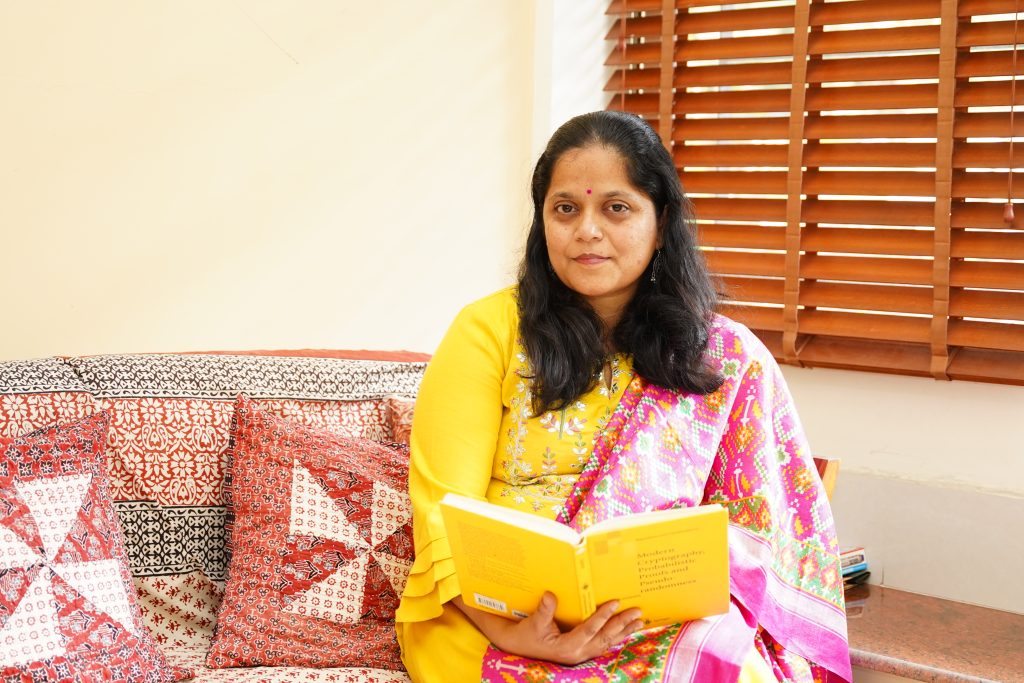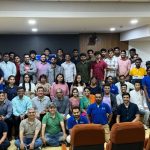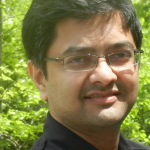Bhavana Kanukurthi’s lab works on developing protocols that allow secure exchange of online data

Gone are the days when carrying around cash was the norm. In recent years, UPI has become an integral part of our lives. From buying tea and snacks to paying bills or transferring money to someone’s bank account, UPI is the most popular mode of payment today. Have you ever wondered what happens behind the scenes to make such a payment system robust and secure?
The answer lies in the field of cryptography, which involves protecting online information by converting it into a form that cannot be read or manipulated by unauthorised third parties. As the world becomes increasingly interconnected, there is a growing need for new and updated cryptographic methods to secure our data. This is the area that Bhavana Kanukurthi, Associate Professor at the Department of Computer Science and Automation (CSA), and her group work on – applying cryptography to secure various systems, including payment gateways, online auctions and digital elections.
Cryptography is deeply rooted in mathematical principles, and Bhavana’s fascination with the world of mathematics started during her school days. “I liked logic, writing proofs and solving problems. When I discovered that computer science has all these elements, that really appealed to me,” recalls Bhavana.
She went on to pursue a Bachelor’s degree in computer science at the Hindustan College of Engineering, affiliated to Anna University, in Chennai. During this time, she secured an opportunity to work with theoretical computer scientist Venkatesh Raman at the Institute of Mathematical Sciences (IMSc), Chennai, where she dipped her toes into the fascinating world of research for the first time. It was here that she realised how much she enjoyed doing research – the challenges it posed and the unique opportunities to learn from.
Having caught the research bug, Bhavana then applied to Boston University (BU), where she pursued her PhD under Leonid Reyzin, Professor at the Department of Computer Science. She was deeply inspired by her PhD advisor – he was always approachable and took an interest in every idea that his students presented to him, she remembers. “I have tried to incorporate a lot of that in the way I conduct myself with my students.” Following her doctoral studies, she joined the University of California, Los Angeles (UCLA) as a postdoctoral researcher, before joining CSA as an Assistant Professor in 2014. She credits the research ecosystem at IISc for her research progress. A lot of her recent research has been carried out with her colleague and collaborator Chaya Ganesh, Assistant Professor at CSA, and their students.
One of the areas her group works on is developing encryption schemes to protect data during online communication. Her lab is specifically interested in developing codes called non-malleable codes (NMC). Traditional encryption methods may prevent the messages from being read by an inquisitive third party, but do not protect them from being changed or tampered with. However, when messages are encrypted using NMC, if the attacker tries to modify the encrypted message, the message either cannot be decrypted, or it becomes decrypted as a completely different message. This is crucial in systems where integrity of data is important such as financial transactions, electronic voting and healthcare records. Recently, Bhavana’s lab has proposed a way to build NMC that takes up orders of magnitude less space than previously proposed methods. This is important because encrypted data always takes up larger storage space than the original data, but the larger the size, the more inefficient it becomes to store, read, write and send the data. “The point is, how do you put your necessary checks and balances without increasing the data size too much?” explains Bhavana.

Another security challenge that her lab is trying to address involves online auctions. Nowadays, online auctions have emerged as a great option to buy and sell a wide variety of items – from antiques to ad spaces to broadband spectrum. Given the high stakes involved, privacy and fairness become important considerations and Bhavana’s lab works on developing methods to safely conduct such auctions.
Securing communication during online auctions poses unique challenges. “Because everybody has an incentive to win, they don’t need to play honestly, they could potentially cheat. So, can you somehow disincentivise them?” asks Bhavana. The goal here is to design an auction protocol (a set of rules governing how the auction should take place) that is secure from all possible cheating strategies of the participants, because even though all the communication is encrypted, it could still lead to potential foul play. “If I’m able to copy your bid and just increase it by one, I’ve done enough to win the auction, even though it’s encrypted. So, encryption will not solve your problem in an auction setting,” she explains. In a recent study, Bhavana, her colleague Chaya Ganesh, and their student Girisha Shankar, have developed a simple yet secure method to conduct such online auctions that neither takes up too much space nor time to implement, and ensures that all parties involved participate in a fair manner.
Along the same lines, developing security protocols for electronic voting is another area her lab works on. Electronic voting can be faster and more accessible to the masses than paper-based voting. It can also be more environmentally friendly. But the security requirements here are quite different. The protocols should allow people to vote electronically in a way that is safe and anonymous. At the same time, no voter should be able to vote twice. “In the digital world, you might be sitting at your laptop and casting your vote, but you would want deniability. Someone should not be able to come later and intimidate you to show whom you have voted for,” says Bhavana. Her lab is in the process of developing such an election protocol that can comply with all the above requirements.
Bhavana thinks that it is an extremely exciting time to be a cryptographer in India because digital currency is booming, bringing along various security challenges. “There are a lot of India-specific issues that come up with security because we have a very diverse population, and the perception of security risks is very different across people. For example, you might have an older generation that might think it is okay to give out passwords. There is a lot of behavioural science involved, and I think it would be interesting to see how to build things which consider the differences in people’s perception of threat.”
Apart from teaching and research, Bhavana enjoys painting in her spare time. Reflecting on her experiences, she says that the key to surviving in academia is to be patient and focus on one’s non-academic life as well. “Not everybody can publish in the hottest topic because people are publishing at a very rapid pace. You just need to be yourself and take your time. It’s important to go with the flow and stay true to yourself.”






